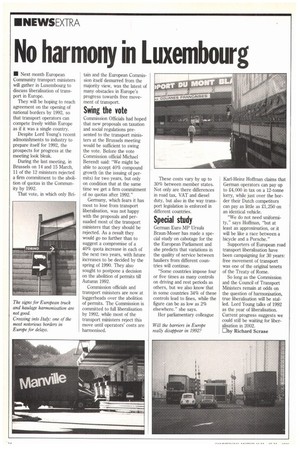No harmony in Luxembourg
Page 18

If you've noticed an error in this article please click here to report it so we can fix it.
• Next month European Community transport ministers will gather in Luxembourg to discuss liberalisation of transport in Europe.
They will be hoping to reach agreement on the opening of national borders by 1992, so that transport operators can compete freely within Europe as if it was a single country.
Despite Lord Young's recent admonishments to industry to prepare itself for 1992, the prospects for progress at the meeting look bleak.
During the last meeting, in Brussels on 14 and 15 March, 11 of the 12 ministers rejected a firm commitment to the abolition of quotas in the Community by 1992.
That vote, in which only Bri thin and the European Commission itself demurred from the majority view, was the latest of many obstacles in Europe's progress towards free movement of transport.
Swing the vote
Commission Officials had hoped that new proposals on taxation and social regulations presented to the transport ministers at the Brussels meeting would be sufficient to swing the vote. Before the vote Commission official Michael Berendt said: "We might be able to accept 40% compound growth (in the issuing of permits) for two years, but only on condition that at the same time we get a firm commitment of no quotas after 1992."
Germany, which fears it has most to lose from transport liberalisation, was not happy with the proposals and persuaded most of the transport ministers that they should be rejected. As a result they would go no further than to suggest a compromise of a 40% quota increase in each of the next two years, with future increases to be decided by the spring of 1990. They also sought to postpone a decision on the abolition of permits till Autumn 1992.
Commission officials and transport ministers are now at loggerheads over the abolition of permits. The Commission is committed to full liberalisation by 1992, while most of the transport ministers reject this move until operators' costs are harmonised.
These costs vary by up to 30% between member states. Not only are there differences in road tax, VAT and diesel duty, but also in the way transport legislation is enforced in different countries.
Special study
German Euro MP Ursula Braun-Moser has made a special study on cabotage for the the European Parliament and she predicts that variations in the quality of service between hauliers from different countries will continue.
"Some countries impose four or five times as many controls on driving and rest periods as others, but we also know that in some countries 34% of these controls lead to fines, while the figure can be as low as 2% elsewhere." she says.
Her parliamentary colleague Karl-Heinz Hoffman claims that German operators can pay up to 24,000 in tax on a 12-tonne lorry, while just over the border their Dutch competitors can pay as little as 21,250 on an identical vehicle.
"We do not need uniformity," says Hoffman, "but at least an approximation, or it will be lace a race between a bicycle and a Porsche."
Supporters of European road transport liberalisation have been campaigning for 30 years: free movement of transport was one of the original tenets of the Treaty of Rome.
So long as the Commission and the Council of Transport Ministers remain at odds on the question of harmonisation, true liberalisation will be stalled. Lord Young talks of 1992 as the year of liberalisation. Current progress suggests we could still be waiting for liberalisation in 2002.
Oby Richard Scrase


























































































































































